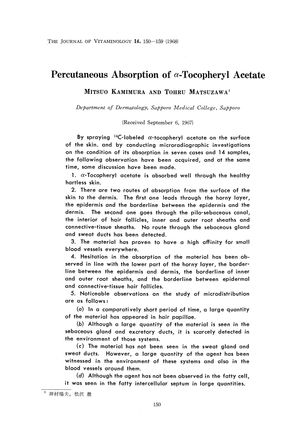Percutaneous Absorption of Alpha-Tocopheryl Acetate
January 1968
in “
THE JOURNAL OF VITAMINOLOGY
”

TLDR α-Tocopheryl acetate is well absorbed through healthy skin.
The 1968 study by Kamimura and Matsuzawa examined the percutaneous absorption of α-tocopheryl acetate in 7 patients and 14 skin samples, finding it was well absorbed through healthy skin primarily via the epidermis and hair follicles. The compound showed a high affinity for small blood vessels and was notably present in hair papillae shortly after application. While it appeared in sebaceous glands, it was not detected in their immediate environment. The study suggested a potential conversion to α-tocopherol during absorption, though this was not confirmed. The findings indicated that α-tocopheryl acetate could penetrate skin layers more effectively than water-soluble substances, with no absolute barriers to its absorption.

